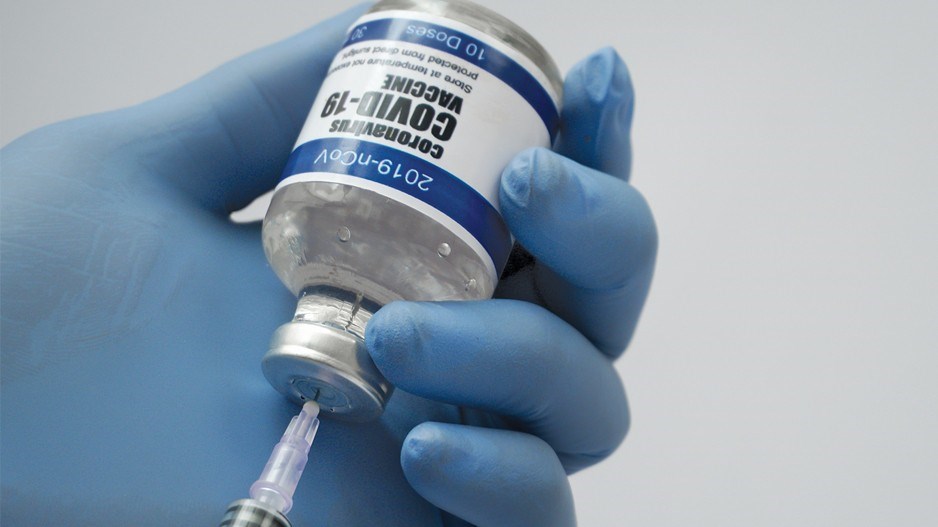The highly transmissible COVID variant first detected in India continues to trail behind the U.K. and Brazilian variants in B.C.
About 500 COVID cases in the province have tested positive for the B.1.617.2 or Delta variant. The B.1.1.7 or Alpha variant first detected in the U.K. continues to be the dominant variant in both B.C. and across Canada.
From May 16-22, the Alpha variant was found in 56 per cent of cases and the P.1 variant, originally found in Brazil, was found in 40 per cent in B.C. The Delta variant accounts for about three per cent of cases.
“We’re not seeing it replace the more common ones that we are seeing,” said provincial health officer Dr. Bonnie Henry, adding screening for the Delta strain has been problematic, because some screening tests can’t discern between the Delta and the B.1.351, first detected in South Africa.
B.C. Centre for Disease Control labs have now returned to conducting labour-intensive and expensive whole-genome sequencing on all new cases so “we can tell exactly what strains are circulating in our province,” said Henry. The days-long process analyzes the entire genome to detect mutations.
The Delta variant has been transmitted in a number of clusters and one outbreak in a care home “that we’re watching very carefully,” said Henry, noting methods such as physical distancing help reduce transmission for all variants of the virus.
Henry and the country’s top public health doctor, Theresa Tam, are encouraging people to get a full two doses of vaccine, now that the Delta variant has been found across the country. Two doses are effective against all strains of the virus, they say.
The Delta variant, believed to be behind recent spikes in COVID-19 cases in parts of the United Kingdom, has been shown to be more transmissible than previous versions of the virus, Tam said.
Peel Public Health in Ontario, one of the country’s most COVID-ravaged areas, said as of Wednesday, 100 cases of the Delta variant had been identified in the region, leading Brampton, Ont., Mayor Patrick Brown to urge the province to prioritize the area for second doses.
Preliminary data released last week from Public Health England suggested that COVID-19 vaccines from Pfizer-BioNTech and Oxford-AstraZeneca were effective against the new variant after two doses, but less efficacy was shown with only one dose.
“For all strains, having two doses gives us greater personal protection,” said Henry, adding increasing the number of fully vaccinated individuals is beneficial for the community as a whole.
“Having everybody with a single dose is the most important single factor to get us to reducing community transmission overall,” said Henry. “And then we need to boost everybody’s individual protection with a second dose, starting with those who are more likely to have severe illness or death from COVID-19.”
If COVID-19 cases begin increasing over the next few weeks, a plan to ease restrictions starting as soon as June 15 and July 1 will be slowed until more people receive second doses, she said. “But I think we are confident from a public-health perspective that we have the tools in place right now that will safely get us through this next few weeks and months.” she said.
Sixty-five per cent of eligible Canadians had received at least one dose of a COVID-19 vaccine as of Friday, but vaccine trackers show roughly seven per cent of the eligible population is fully vaccinated.
Tam said the heightened transmissibility of Delta is a concern. “[It] means in under-vaccinated populations, or if we let go [of] public health measures … in the context of a transmissible variant, that variant could well take off and replace other viruses in the communities,” she said. “So it is very important to get that second dose when variants such as the Delta variant [are] in our community.”
Several provinces are speeding up their second-dose rollouts as more vaccine supply pours into the country.
B.C. recently reduced the second-dose interval to a minimum of eight weeks from about 16 weeks.
Prime Minister Trudeau announced Friday that large shipments of vaccines will continue through the summer, with more than two million Pfizer doses expected each week until the end of August.
Trudeau said nine million Pfizer doses will arrive in July with another 9.1 million expected in August. He added that Canada has also negotiated an option for three million more Pfizer doses to be delivered in September.
Trudeau said he’s been encouraged by the country’s vaccine rollout, adding that Canadians have “reason to be hopeful about this summer and fall.”
“The more people vaccinated, the safer we all are…. So let’s start looking forward to more of what we love, from camping to dinner with friends,” he said.
COVID-19 cases and hospitalizations continue to trend downward in parts of the country while vaccinations ramp up.
Tam said Canada “does a lot more sequencing” than many other countries, adding that as COVID-19 cases continue to decline, provinces will “[move] towards sequencing a vast majority of the positive cases.”
The U.K. government said in a report last month that both Pfizer and AstraZeneca were 33 per cent effective against symptomatic disease caused by the Delta variant three weeks after the first dose, but that number rose above 80 per cent after two doses.



